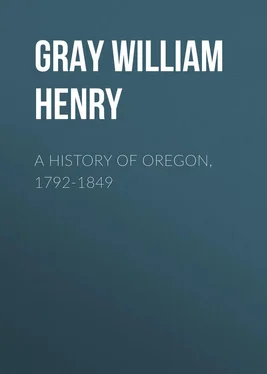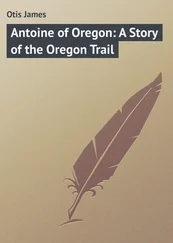William Gray - A History of Oregon, 1792-1849
Здесь есть возможность читать онлайн «William Gray - A History of Oregon, 1792-1849» — ознакомительный отрывок электронной книги совершенно бесплатно, а после прочтения отрывка купить полную версию. В некоторых случаях можно слушать аудио, скачать через торрент в формате fb2 и присутствует краткое содержание. Жанр: literature_19, foreign_antique, foreign_prose, Историческая проза, на английском языке. Описание произведения, (предисловие) а так же отзывы посетителей доступны на портале библиотеки ЛибКат.
- Название:A History of Oregon, 1792-1849
- Автор:
- Жанр:
- Год:неизвестен
- ISBN:нет данных
- Рейтинг книги:5 / 5. Голосов: 1
-
Избранное:Добавить в избранное
- Отзывы:
-
Ваша оценка:
- 100
- 1
- 2
- 3
- 4
- 5
A History of Oregon, 1792-1849: краткое содержание, описание и аннотация
Предлагаем к чтению аннотацию, описание, краткое содержание или предисловие (зависит от того, что написал сам автор книги «A History of Oregon, 1792-1849»). Если вы не нашли необходимую информацию о книге — напишите в комментариях, мы постараемся отыскать её.
A History of Oregon, 1792-1849 — читать онлайн ознакомительный отрывок
Ниже представлен текст книги, разбитый по страницам. Система сохранения места последней прочитанной страницы, позволяет с удобством читать онлайн бесплатно книгу «A History of Oregon, 1792-1849», без необходимости каждый раз заново искать на чём Вы остановились. Поставьте закладку, и сможете в любой момент перейти на страницу, на которой закончили чтение.
Интервал:
Закладка:
Was this the case in 1858? Show me the man who denies it, and I will show you a man devoid of moral perception, destitute of the principle of right dealing between man and man; yet this same Hudson’s Bay Company claim credit for saving the thousands of men they had robbed of their hard cash, in not allowing a few sacks of old flour and a quantity of damaged bacon to be sold to exceed one hundred per cent. above prime cost. “Their goods were very reasonable,” says the apologist; “their trade was honorable.” Has any one ever before attempted to claim honorable dealing for companies pursuing invariably the same selfish and avaricious course? This company is not satisfied with the privilege they have had of robbing the natives of this coast, their French and half-native servants, the American settlers, and their own countrymen, while dependent upon them; but now, when they can no longer rob and steal from half a continent, they come to our government at Washington and make a demand for five millions of dollars for giving up this barefaced open robbery of a whole country they never had the shadow of a right to. It is possible the honorable commissioners may admit this arrogant and unjust claim. If they do, – one single farthing of it, – they deserve the curses due to the company who have robbed the native inhabitants of all their labor, their own servants they brought to it, the country of all they could get from it that was of any value to them, and the nation upon whom they call for any amount, be it great or small.
I have not time, and it would be out of place, to say more upon this subject, at this rime, in the historical sketches we propose to give. Be assured we do not write without knowing what we say, and being prepared to prove our statements with facts that have come under our own observation while in the country. We will leave the Hudson’s Bay Company and return to our mission party.
After getting a full supply of salmon for a tin whistle, or its equivalent, a smell of trail-rope tobacco, we came to the ford at the three islands in Snake River, crossed all safe, except a short swim for Dr. Whitman and his cart on coming out on the north side or right bank of the river. As nothing serious occurred, we passed on to camp. The next day, in passing along the foot hills of the range of mountains separating the waters of the Snake River and La Rivière aux Bois, we came to the warm springs, in which we boiled a piece of salmon. Then we struck the main Boise River, as it comes out of the mountain, not far below the present location of Boise City; thence, about ten miles down the river, and into the bend, where we found a miserable pen of a place, at that time called Fort Boise. It consisted of cotton-wood poles and crooked sticks set in a trench, and pretended to be fastened near the top. The houses or quarters were also of poles, open; in fact, the whole concern could hardly be called a passable corral, or pen for horses and cattle. I think, from appearances, the fort had been used to corral or catch horses in. We were informed that it was established in opposition to Fort Hall, to prevent the Indians, as much as possible, from giving their trade to Captain Wyeth, and that the company expected, if they kept it up, to remove it near the mouth of Boise River.
At this place, McLeod and McKay, and all the Johnny Crapauds of the company, united in the opinion that it was impossible to get the Doctor’s cart any further without taking it all apart and bending the iron tires on the wheels, and packing it in par-fleshes (the dried hide of the buffalo, used as an outside covering for packs), and in that way we might get it through, if the animals we packed it upon did not fall with it from the precipices over which we must pass. Impossible to get it through any other way. After several consultations, and some very decided expressions against any further attempt to take the wagon further, a compromise was made, that, after the party had reached their permanent location, the Doctor or Mr. Gray would return with the Hudson’s Bay Company’s caravan and get the wagon and bring it through. To this proposition the Doctor consented. The wagon was left, to the great advantage of the Hudson’s Bay Company, in removing their timber and material to build their new fort, as was contemplated, that and the following seasons.
All our goods were placed upon the tallest horses we had, and led across. Mrs. Spalding and Mrs. Whitman were ferried over on a bulrush raft, made by the Indians for crossing. The tops of the rushes were tied with grass ropes, and spread and so arranged that, by lying quite flat upon the rushes and sticks they were conveyed over in safety. Portions of our clothing and goods, as was expected, came in contact with the water, and some delay caused to dry and repack. This attended to, the party proceeded on the present wagon trail till they reached the Grand Ronde; thence they ascended the mountain on the west side of the main river, passed over into a deep cañon, through thick timber, ascended the mountain, and came out on to the Umatilla, not far from the present wagon route.
As the party began to descend from the western slope of the Blue Mountains, the view was surpassingly grand. Before us lay the great valley of the Columbia; on the west, and in full view, Mount Hood rose amid the lofty range of the Cascade Mountains, ninety miles distant. To the south of Mount Hood stood Mount Adams, and to the north, Mount Rainier; while, with the assistance of Mr. McKay, we could trace the course of the Columbia, and determine the location of Wallawalla. It was quite late in the evening before we reached camp on the Umatilla, being delayed by our cattle, their feet having become worn and tender in passing over the sharp rocks, there being but little signs of a trail where we passed over the Blue Mountains in 1836.
CHAPTER XVIII
Arrival at Fort Wallawalla. – Reception. – The fort in 1836. – Voyage down the Columbia River. – Portage at Celilo. – At Dalles. – A storm. – The Flatheads. – Portage at the Cascades.
Next day Mr. McLeod left the train in charge of Mr. McKay, and started for the fort, having obtained a fresh horse from the Cayuse Indians. The party, with Hudson’s Bay Company’s furs and mission cattle, traveled slowly, and in two days and a half reached old Fort Wallawalla, on the Columbia River, – on the second day of September, 1836, a little over four months from the time they left Missouri. Traveling by time from two to three miles per hour, making it two thousand two hundred and fifty miles.
Their reception must have been witnessed to be fully realized. The gates of the fort were thrown open, the ladies assisted from their horses, and every demonstration of joy and respect manifested. The party were soon led into an apartment, the best the establishment had to offer. Their horses and mules were unloaded and cared for; the cattle were not neglected. It appeared we had arrived among the best of friends instead of total strangers, and were being welcomed home in the most cordial manner. We found the gentleman in charge, Mr. P. C. Pambrun, a French-Canadian by birth, all that we could wish, and more than we expected.
Mr. J. K. Townsend, the naturalist, we found at Wallawalla. He had been sent across the Rocky Mountains, in company with Dr. Nutall, a geologist, by a society in Philadelphia, in 1834, in company with Captain Wyeth. He had remained in the country to complete his collection of specimens of plants and birds, and was awaiting the return of the Hudson’s Bay Company’s ship, to reach the Sandwich Islands, on his homeward course, having failed to get an escort to connect with Captain Wyeth, and return by way of the Rocky Mountains. From Mr. Townsend the mission party received much useful information relating to the course they should pursue in their intercourse with the Hudson’s Bay Company and the Indians. He appeared to take a deep interest in the objects of the mission, confirming, from his own observation, the information already received, cautioning the party not to do any thing with the Indians that would interfere with the Hudson’s Bay Company’s trade. Repeating almost verbatim Captain Wyeth’s words, “The company will be glad to have you in the country, and your influence to improve their servants, and their native wives and children. As to the Indians you have come to teach, they do not want them to be any more enlightened. The company now have absolute control over them, and that is all they require. As to Mr. Pambrun, at this place, he is a kind, good-hearted gentleman, and will do any thing he can for you. He has already received his orders in anticipation of your arrival, and will obey them implicitly; should the company learn from him, or any other source, that you are here and do not comply with their regulations and treatment of the Indians, they will cut off your supplies, and leave you to perish among the Indians you are here to benefit. The company have made arrangements, and expect you to visit Vancouver, their principal depot in the country, before you select your location.”
Читать дальшеИнтервал:
Закладка:
Похожие книги на «A History of Oregon, 1792-1849»
Представляем Вашему вниманию похожие книги на «A History of Oregon, 1792-1849» списком для выбора. Мы отобрали схожую по названию и смыслу литературу в надежде предоставить читателям больше вариантов отыскать новые, интересные, ещё непрочитанные произведения.
Обсуждение, отзывы о книге «A History of Oregon, 1792-1849» и просто собственные мнения читателей. Оставьте ваши комментарии, напишите, что Вы думаете о произведении, его смысле или главных героях. Укажите что конкретно понравилось, а что нет, и почему Вы так считаете.












